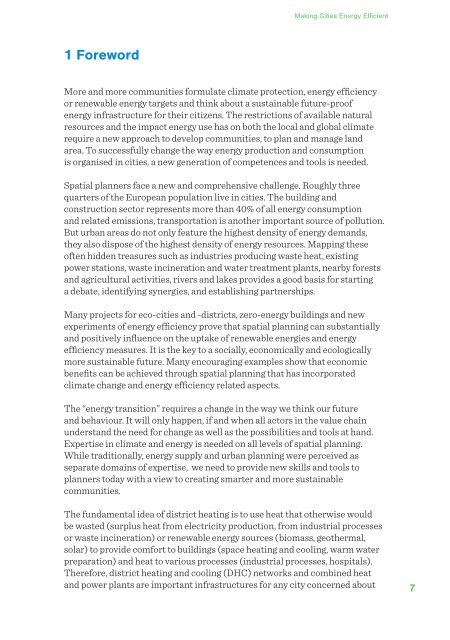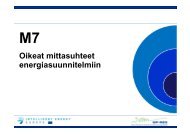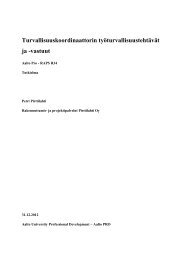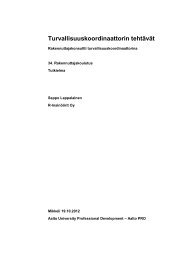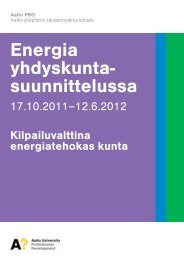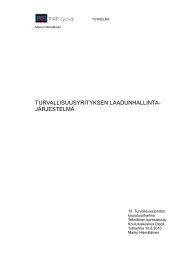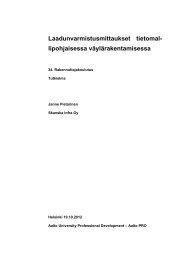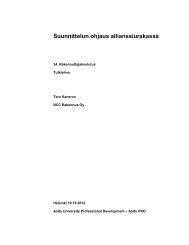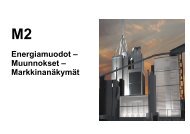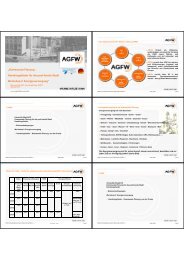Urban and Regional Planning adopting RES - Sitra
Urban and Regional Planning adopting RES - Sitra
Urban and Regional Planning adopting RES - Sitra
You also want an ePaper? Increase the reach of your titles
YUMPU automatically turns print PDFs into web optimized ePapers that Google loves.
Making Cities Energy Efficient<br />
1 Foreword<br />
More <strong>and</strong> more communities formulate climate protection, energy efficiency<br />
or renewable energy targets <strong>and</strong> think about a sustainable future-proof<br />
energy infrastructure for their citizens. The restrictions of available natural<br />
resources <strong>and</strong> the impact energy use has on both the local <strong>and</strong> global climate<br />
require a new approach to develop communities, to plan <strong>and</strong> manage l<strong>and</strong><br />
area. To successfully change the way energy production <strong>and</strong> consumption<br />
is organised in cities, a new generation of competences <strong>and</strong> tools is needed.<br />
Spatial planners face a new <strong>and</strong> comprehensive challenge. Roughly three<br />
quarters of the European population live in cities. The building <strong>and</strong><br />
construction sector represents more than 40% of all energy consumption<br />
<strong>and</strong> related emissions, transportation is another important source of pollution.<br />
But urban areas do not only feature the highest density of energy dem<strong>and</strong>s,<br />
they also dispose of the highest density of energy resources. Mapping these<br />
often hidden treasures such as industries producing waste heat, existing<br />
power stations, waste incineration <strong>and</strong> water treatment plants, nearby forests<br />
<strong>and</strong> agricultural activities, rivers <strong>and</strong> lakes provides a good basis for starting<br />
a debate, identifying synergies, <strong>and</strong> establishing partnerships.<br />
Many projects for eco-cities <strong>and</strong> -districts, zero-energy buildings <strong>and</strong> new<br />
experiments of energy efficiency prove that spatial planning can substantially<br />
<strong>and</strong> positively influence on the uptake of renewable energies <strong>and</strong> energy<br />
efficiency measures. It is the key to a socially, economically <strong>and</strong> ecologically<br />
more sustainable future. Many encouraging examples show that economic<br />
benefits can be achieved through spatial planning that has incorporated<br />
climate change <strong>and</strong> energy efficiency related aspects.<br />
The “energy transition” requires a change in the way we think our future<br />
<strong>and</strong> behaviour. It will only happen, if <strong>and</strong> when all actors in the value chain<br />
underst<strong>and</strong> the need for change as well as the possibilities <strong>and</strong> tools at h<strong>and</strong>.<br />
Expertise in climate <strong>and</strong> energy is needed on all levels of spatial planning.<br />
While traditionally, energy supply <strong>and</strong> urban planning were perceived as<br />
separate domains of expertise, we need to provide new skills <strong>and</strong> tools to<br />
planners today with a view to creating smarter <strong>and</strong> more sustainable<br />
communities.<br />
The fundamental idea of district heating is to use heat that otherwise would<br />
be wasted (surplus heat from electricity production, from industrial processes<br />
or waste incineration) or renewable energy sources (biomass, geothermal,<br />
solar) to provide comfort to buildings (space heating <strong>and</strong> cooling, warm water<br />
preparation) <strong>and</strong> heat to various processes (industrial processes, hospitals).<br />
Therefore, district heating <strong>and</strong> cooling (DHC) networks <strong>and</strong> combined heat<br />
<strong>and</strong> power plants are important infrastructures for any city concerned about<br />
7


